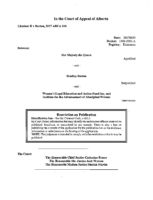On Sept. 26, 2017, Dino Bottos and the Bottos Law Group filed their application for Leave to Appeal to the Supreme Court of Canada in R v Barton.
This is the second Leave to Appeal filed at the SCC by Bottos Law Group recently. It follows from the Bradley Barton’s acquittal by a jury at trial of first-degree murder, and the subsequent Alberta Court of Appeal decision overturning that acquittal in R v Barton, 2017 ABCA 216.
From the Leave to Appeal:
“As this application shall attempt to demonstrate, the notion that the jury charge in this case contained errors that were “several in number, serious in scope, and significant in impact”, as the Court of Appeal contends, is dubious. On the contrary, it is the Court of Appeal’s decision to set aside the jury verdict that is based on errors that are several, serious in scope and significant in impact. In particular, the Court of Appeal’s decision:
- demonstrates an alarming disregard for critical components of the adversarial and appellate processes, including: (i) the impact of the Crown advancing new theories on appeal that conflict with positions taken at trial; (ii) the proper role of an appellate court in raising new grounds of appeal; (iii) the right of a party to obtain transcripts from an appellate hearing; (iv) the ability to rely upon new grounds of appeal raised by an intervener; (v) the correct approach to reviewing jury charges; and (vi) the need to assess the materiality of legal errors in deciding whether to order a new trial after a jury acquittal, particularly when the alleged errors relate to grounds of argument that were a marginal aspect of the Crown’s case against the accused;
- alters the existing state of the law in dramatic fashion, imposing a raft of mandatory new jury instructions that previously were matters for the trial judge’s discretion; and,
- conflicts with established appellate and Supreme Court authority on significant points, including: (i) whether the Crown’s acceptance of a theory or argument at trial bars it from advancing a different theory on an appeal from acquittal; (ii) the need to instruct the jury about speculative motives that are unfounded in the evidence when giving an instruction on absence of motive; and (iii) the proper approach in defining consent when a person suffers bodily harm as a result of sexual activity.
These points demonstrate the public importance of this appeal, though the particular context of the case makes it especially deserving of leave. At all levels the case has generated an inordinate amount of media attention, stimulating nationwide discussion about the issues raised. Furthermore, the stakes of this appeal for the applicant could not be higher, as the case involves the reversal of an acquittal granted by a jury to a charge of first-degree murder.”
The full application can be read below.
